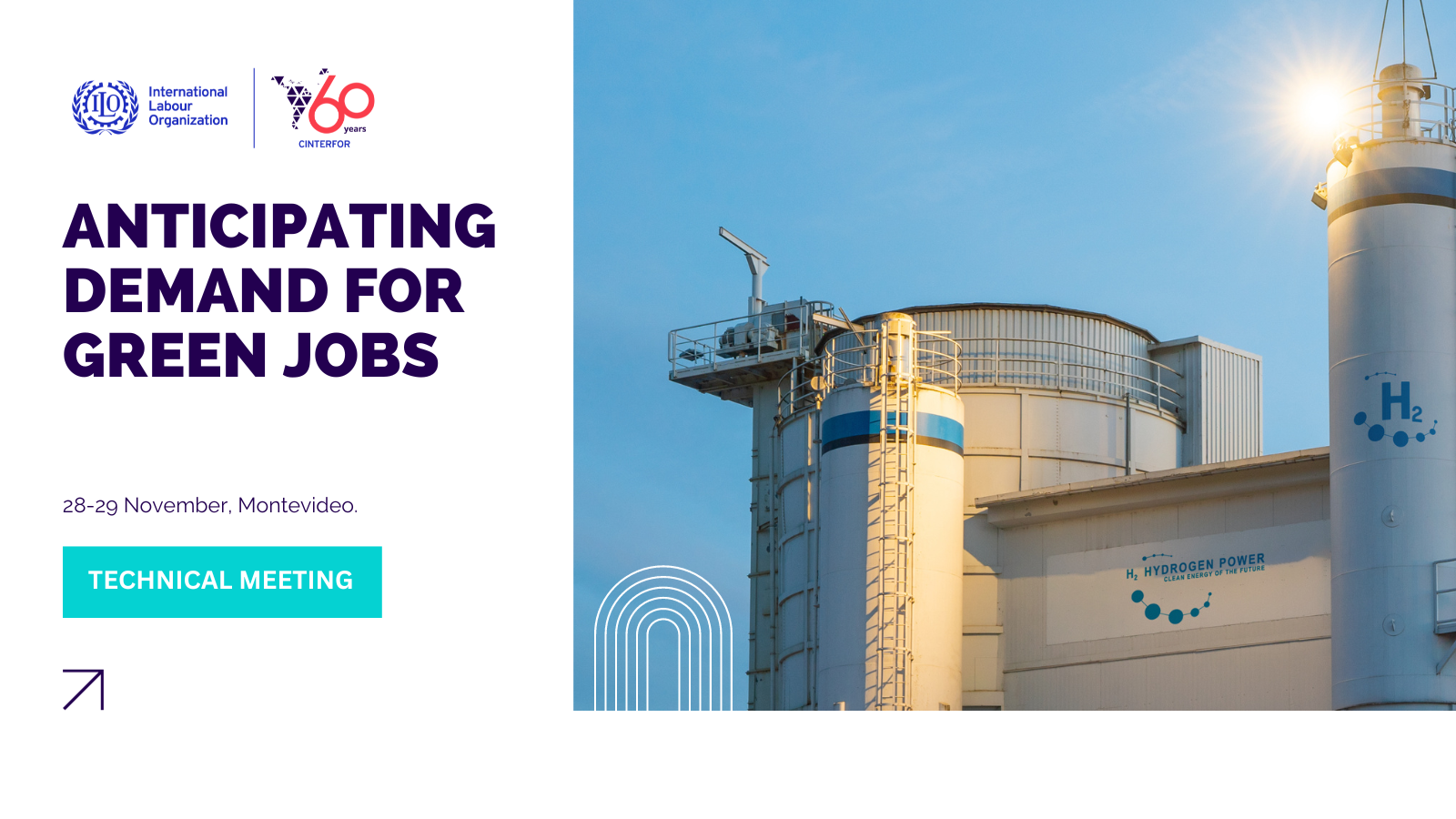Technical meeting: Anticipating demand and defining green job profiles. Results in the Green Hydrogen sector

Green jobs contribute to preserving and restoring the environment through aspects such as efficiency in the use of energy and raw materials, limiting greenhouse gas emissions, minimising waste production and pollution, protecting and restoring ecosystems and thus contributing to climate change adaptation. They are key to promoting sustainable development and have the potential to increase social inclusion and equal opportunities, while generating new economic opportunities.
The transformations to move towards low-carbon economies require workers to develop new skills and competences to adapt to the requirements of new jobs. And to meet this demand for new or upgraded skills, education and training systems have a central role to play in evolving and ensuring equal opportunities.
Since November 2022, the ILO/Cinterfor, with the technical assistance of SENAI and the support of the ILO Department of Multilateral Partnerships and Development Cooperation (PARTNERSHIPS), has been developing a process together with teams from Chile, the Dominican Republic and Uruguay for the transfer of knowledge and practices for the generation of prospective studies on employment and vocational training for green sectors using the SENAI Prospective model. It is based on the observation of the labour market, the identification of technological, organisational and occupational trends and their impact on vocational training strategies and programmes.
For this reason, on 28 and 29 November 2023, a technical meeting was held in Montevideo to learn the results of these studies and also the advances on Green Hydrogen that are being generated in the region.De la reunión participaron representantes del Ministerio de Trabajo de Chile, ChileValora, SENCE de Chile, SENA de Colombia (virtualmente), INA de Costa Rica, INFOTEP de República Dominica, Ministerio de Trabajo/DINAE de Uruguay, INEFOP y Ministerio de Industria, Energía y Minería de Uruguay, junto a SENAI de Brasil y OIT/Cinterfor.
During the meeting, each team presented the results achieved in the work process, where Chile addressed green hydrogen technology, Uruguay on electric mobility and the Dominican Republic on photovoltaic energy. In addition, the opportunity was taken to share the progress and projects that each of the participating countries is developing or planning on the production of green hydrogen.
As part of the Agenda, Anita Amorin, from the ILO Partnership Department, together with Andrea Villavicencio, also participated and highlighted the role of South-South cooperation in this transition.
Some of the conclusions of the event allow us to affirm that the institutions have made progress in the development of competency profiles linked to green hydrogen. There is a trend towards a demand for more complex competences associated with chemical principles and the management of information for monitoring and control of systems, safety for the operation of the production, storage and transport phases. Likewise, the importance of transversal competences and of advancing and deepening training actions in STEAM and inclusion is clear.
The role that dual training or quality apprenticeships can play in the development of the necessary skills was also highlighted, as well as the incorporation of micro-certifications and advanced training courses at the technical level.
The ILO/Cinterfor will continue to work with this network, expanding the number of institutions involved and generating instances and mechanisms to continue sharing progress and practices that strengthen the role of vocational training and technical education in the transition processes towards environmentally sustainable economies and societies.
- Prospective on employment and vocational training in green sectors Green Hydrogen in Chile. Ministry of Labour, SENCE and ChileValora.
- Presentation of INA of Costa Rica
- Gas Sector Roundtable. Progress on the Standardisation of Labour Competences. Human Talent in the Gas and Hydrogen sector in Colombia. SENA, Colombia
- The future of the Energy Transition. Application of the Prospective Model for the Labour Market. National Industry Observatory. SENAI, Brazil.
- The use of Green Hydrogen and the cooperation between Brazil and Germany. SENAI, Brazil
- Prospective study on employment demand and vocational training: Photovoltaic energy sector in the Dominican Republic. INFOTEP
- Prospective study on employment and vocational training in green sectors. Electric vehicles in Uruguay. MTSS/DINAE, INEFOP, UTEC, Uruguay
- Update of the agenda for the development of Green H2 and derivatives in Uruguay. MIEM Uruguay





